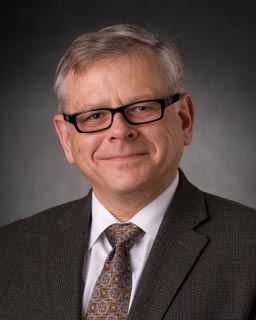Electrical Engineering's Pasko elected Fellow of the American Geophysical Union
8/28/2018
UNIVERSITY PARK, Pa. — Victor Pasko, professor of electrical engineering, has been elected a Fellow of the American Geophysical Union (AGU) for developing new understanding of lightning driven electrical gas discharges in the upper regions of Earth’s atmosphere.
According to the AGU, “AGU Fellows are recognized for their scientific eminence in the Earth and space sciences. Their breadth of interests and the scope of their contributions are remarkable and often groundbreaking. Only 0.1% of AGU membership receives this recognition in any given year.”
“The College of Engineering at Penn State is proud to have Professor Pasko on its faculty and we congratulate him on this well-deserved recognition,” Justin Schwartz, Harold and Inge Marcus Dean of Engineering, said. “Selection as a Fellow of the American Geophysical Union speaks to the tremendous impact of his research and demonstrates that, owing to our remarkable faculty, Penn State is a premier research university addressing critical issues that face humankind.”
Through several National Science Foundation programs, such as Coupling, Energetics, and Dynamics of Atmospheric Regions; Frontiers in Earth-System Dynamics; Aeronomy; Physical and Dynamic Meteorology; Division of Engineering Education and Centers, and the Defense Advanced Research Projects Agency, Pasko has made major research contributions in the Earth and space sciences.
His vast research contributions include the development of a new understanding of electrodynamic coupling of thunderstorms and upper regions of Earth’s atmosphere; experimental discovery of a new electrical discharge phenomenon in Earth’s atmosphere that is manifested in formation of a path of electrical contact between thundercloud tops and the lower ionosphere; development of first principle models of non-thermal and thermal filamentary gas discharges in air, leading to a new understanding of similarity relations and scaling of these discharges with gas pressure; development of mechanisms of bursts of high energy photons in Earth’s atmosphere; and successful model interpretation of infrasonic and gravity waves generated by thunderstorms and aurora.
He has published three book chapters, 117 articles in refereed journals — 83 of which have been published in AGU journals — and more than 300 conference abstracts and proceedings papers. In 2002, Pasko received a National Science Foundation Early Career (CAREER) award, titled “Large Scale Electrodynamic Coupling between the Troposphere, Mesosphere and Ionosphere due to Lightning in Weather Systems.” He received the Editors Citation for Excellence in Refereeing for Geophysical Research Letters in 2007 and the Penn State Engineering Alumni Society Outstanding Research Award in 2016.
In addition, Pasko served as a convener for the Chapman Conference of AGU, titled “The Effects of Thunderstorms and Lightning in the Upper Atmosphere” at Penn State University Park in May 2009, which was attended by 110 professionals from 16 countries.
Pasko received a Ph.D. in electrical engineering from Stanford University and joined Penn State in 2000. In addition to his duties as professor of electrical engineering, he is also the graduate program coordinator in the Department of Electrical Engineering and is a member of the Communications and Space Sciences Laboratory. Outside of Penn State, Pasko serves as an associate editor of Radio Science and the Journal of Geophysical Research and is a member of the AGU, U.S. Commissions H and G of International Union of Radio Science and the Institute of Electrical and Electronics Engineers.
Pasko, among 62 members who make up the 2018 class of Fellows, will be honored and celebrated for his exceptional achievements, visionary leadership, talents and dedication at the Honors Tribute during the AGU Fall Meeting on Wednesday, December 12 in Washington, D.C.
“This kind of accomplishment is not easy to achieve, so I feel very proud, not only of myself, but proud to see Penn State among top research establishments like Stanford University, MIT, and Caltech in this year’s list of Fellows,” Pasko said. “All the work that led to this recognition is not just my personal work — I was lucky to have very good students who worked very hard. In particular, it is great recognition and advancement for space sciences at Penn State, which has historically been very strong.”
AGU galvanizes a community of Earth and space scientists that collaboratively advances and communicates science and its power to ensure a sustainable future. For more information, visit sites.agu.org.




